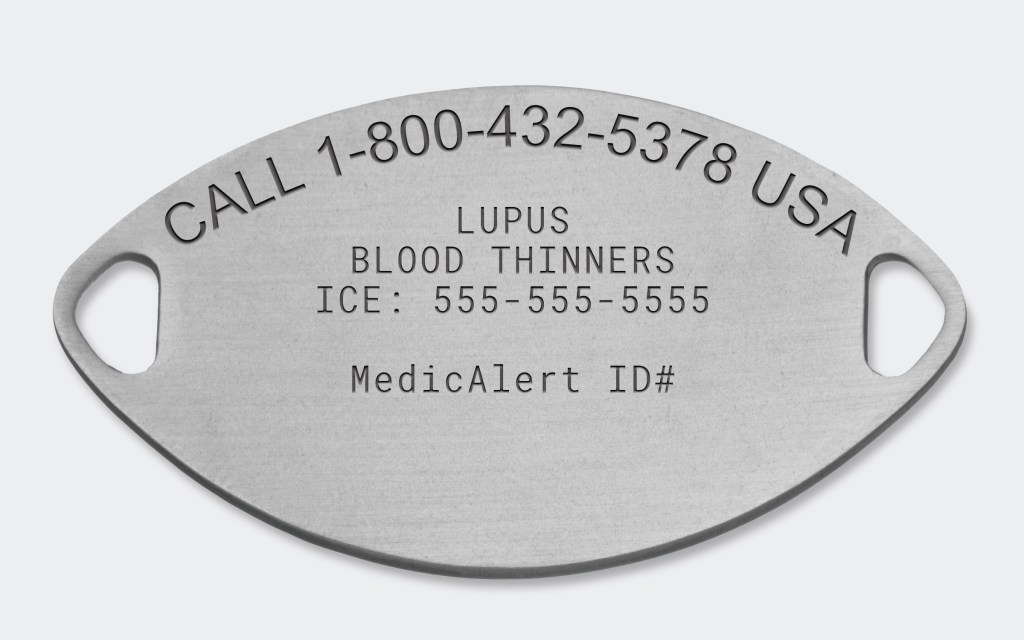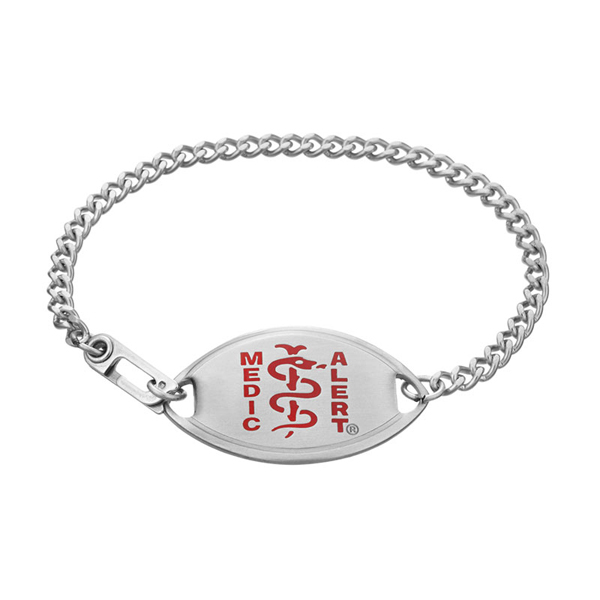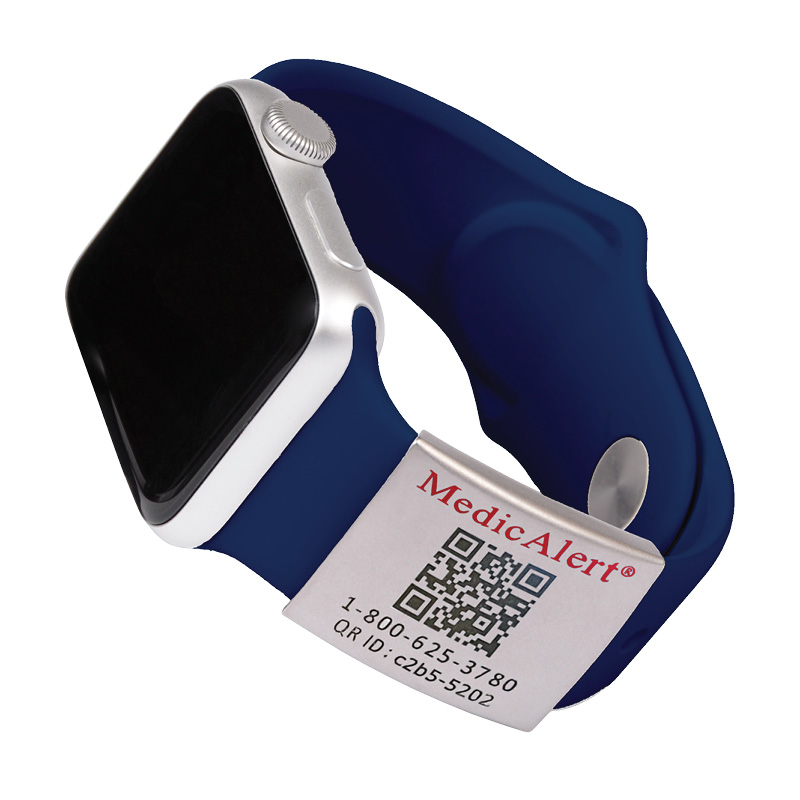
Medical IDs for Blood Thinners
Life on blood thinners can be tricky, and having support is key to your safety. Read below to learn how a medical ID can protect you and your loved ones.
The confidence to live with blood thinners
Life on blood thinners can be tricky. Monitoring your INR, vitamins, supplements, and diet is important to make sure your blood is not too thin or too thick. A medical ID for blood thinners is a potentially life-saving measure for anyone on anticoagulants like Warfarin, Eliquis, Xarelto, and others.
Anticoagulants work by slowing down the clotting process. If you’re on blood thinners, even a seemingly benign cut or bruise can cause excessive bleeding. In an accident or medical emergency, it’s critical the first responders know you’re taking blood thinners. That way, medical personnel will be alert to excessive bleeding and potential internal bleeding.
With a medical ID for blood thinners, emergency responders will immediately know you’re on a medication that affects your treatment. In addition, MedicAlert provides you with a health profile that stores all your vital medical information, including allergies, health conditions, other medications, and implanted devices like a pacemaker or defibrillator (ICD). First responders access your health profile via a personalized QR code or toll-free hotline.
Excessive bleeding can be life-threatening without the right information and treatment. Having your critical information readily available will allow emergency healthcare workers to use reversal agents as necessary during treatment.
That’s why a medical ID for blood thinners is critical for people taking these medications.
How MedicAlert protects people taking blood thinners
One thing you shouldn’t worry about is what could happen if there’s an emergency. MedicAlert’s protection plans offer benefits that extend beyond the ID, providing safety and peace of mind for people taking blood thinner medication.

24/7 Emergency Response
Our team provides first responders the information they need to provide you with fast, accurate care.

Digital Health Profile
All your vital information, all in one place for you and your caregiver--and for first responders in an emergency.

Emergency Contact Notification
We believe that no one should be alone in a crisis. In an emergency, we proactively connect you with your emergency contacts so they can be by your side.

Patient Instructions
Share the information that’s important to your care, such instructions for your implanted device, or contraindication for tests like MRIs.
Pair a medical ID for blood thinners with the protection plan that’s right for you.
MedicAlert is not just an ID, it’s a lifeline.™️
What are blood thinners?
Blood thinners are designed to prevent blood from clotting. These clots can cause life-threatening medical issues such as deep vein thrombosis (DVT), pulmonary embolism (PE), heart attacks, or strokes. By taking blood thinners as prescribed, blood can flow easily in your arteries and veins.
There are two main types of blood thinners used to prevent health issues. They work in different ways, and are used for different conditions.
Antiplatelet drugs prevent platelets from sticking together to form clots. In other words, they interfere with the process of platelets binding together. Most are pills, but some are given intravenously.
Antiplatelet drugs are typically used to treat the formation of blood clots in arteries, which are associated with heart attacks and strokes. They are most commonly used for medical conditions such as angina, atrial fibrillation (AFIB), coronary artery disease (CAD), and history of heart attack or stroke. They are also prescribed post-procedure for coronary artery bypass, angioplasty (placement of stents to open arteries), or heart value surgery.
The most common antiplatelet drug is low dose aspirin. It’s available over the counter, and many people use it daily to prevent blood cells from clumping. Other antiplatelets like Plavix require a prescription.
Anticoagulants are are a more common blood thinning agent. These drugs are designed to slow down the body’s ability to create clots by affecting the body’s blood clotting factor. Anticoagulant medications include Warfarin (brand name Coumadin), that’s been around for decades. Newer medications Eliquis, but Xarelto, Axi. These kinds of blood thinners are prescribed by a physician and can have side effects such as muscle weakness and bruising.
Because these medications are used to thin the blood, falls or other accidents can cause excessive bleeding. If this occurs it is important to receive medical attention as soon as possible. Wearing a medical ID for blood thinners is a secure way to access care, assured that critical information will be relayed to health professionals when it’s needed most.
Types of blood thinners
Antiplatelet Drugs
Aspirin: Although there is an almost never ending flow of new blood thinner medications emerging, aspirin remains a commonly used preventative blood thinner. It is typically given in a low dose for daily use. Aspirin works by inhibiting an enzyme involved in platelet activation. However, you should only use aspirin for prevention of heart disease when it’s recommended by your doctor.
Aggrenox is essentially a stronger prescription aspirin. It is a combination of two medicines, aspirin and dipyridamole. The medication can help to reduce the risk of stroke in people who have had blood clots. It is also used for those who have had mini strokes.
Brilinta (ticagrelor) is typically prescribed following a heart attack and can be used in conjunction with aspirin. It has been proven effective at reducing the chance of recurring heart attacks in people who have had them before and the medication is thought to further reduce the risk of recurrent heart attacks with continued use.
Cilostazol is used to improve the flow of blood to the legs and can help assist with reducing the symptoms of intermittent claudication. Like some of the other blood thinner medications on our top ten list, Cilostazol is an antiplatelet medication, whereby it is used to prevent the platelets in the blood from clumping together.
Effient (prasugrel) prevents your platelets from clumping together into blood clots. This lowers the risk of heart attack, since a heart attack is caused by a clot forming in the vessels around your heart. After you get a stent in your heart, Effient (prasugrel) helps keep the stent open so that your heart continues to get enough blood.
Anticoagulant Drugs
Elequis (apixaban) lowers the risk of both blood clots and strokes, and is a relatively new drug that is thought to be a competitor to the side effects of Coumadin.
Heparin is used to treat and prevent blood clots caused by certain medical conditions or medical procedures. Heparin is also used before surgery to reduce the risk of blood clots.
Plavix (clopidogrel) works by preventing coagulation of the platelets in the blood. It is especially suited for people who have certain medical conditions and heart conditions. It is also used as a preventative tool against the formation of clots in persons who have had a heart attack or stroke.
Pradaxa (dabigatran) is a newer medication that is used primarily in people who have an arterial fibrillation. It is geared towards preventing blood clots and strokes.
Prasugrel may be used in conjunction with aspirin to prevent the formation of clots in people who have been treated with angioplasty,. Like aspirin, Prasugrel is an anti-platelet medication.
Warfarin (brand name Coumadin): Warfarin is one of the most well known medications used to thin the blood. It was discovered in the 1930s and approved for human use in 1954. It’s taken in pill form and works by disrupting the production of vitamin K, one of your body’s clotting factors. Although it’s known for its efficacy, Warfarin requires careful dosing and regular monitoring. It also has numerous side effects including interactions with many drugs, foods, and supplements.
Xarelto (rivaroxaban): Especially useful in recipients of hip replacements and knee replacements, Xarelto is a relative newcomer amongst blood thinner medications. It is also been approved for use in cases of DVT as well as pulmonary embolisms. it’s administered by injection, but does not require constant monitoring.
There are two types of blood thinners — anticoagulants and antiplatelet drugs. Most are delivered via a pill or injection. For immediate blood thinning, there are injectable medications that a patient can use every few hours. Blood thinners are widely used to treat atrial fibrillation, deep vein thrombosis, lupus, and irregular heart rhythms.
Heparin and warfarin are some of the most commonly prescribed anticoagulants. Depending on a person’s diet, these medications can affect the ability to heal. Excessive amounts of vitamin K may cause increased bleeding from even the most basic of cuts.
Here are some common blood thinner medications and their features:
Engraving your MedicAlert ID for blood thinners:
MedicAlert offers free custom engraving on all our blood thinner bracelets and medical ID products. Engravings on medical IDs for blood thinners should include any critical medical information that can protect and save your life in an accident or medical emergency, for example:
The best things to engrave on a medical bracelet for blood thinners include:
- On blood thinners – and ideally the specific medication you’re taking
- Serious allergies
- Medical conditions
- Implanted device (if present)

Sample engraving. Consult our team if you need help engraving your medical ID for blood thinners.
Find your medical ID.
What the risks of blood thinners?
Even life-saving medication can have risks. Excessive bleeding is a well-known risk when taking anticoagulants or antiplatelet drugs. Because blood-thinning agents can make some patients feel dizzy, falling is more likely to occur.
Common side effects of these drugs include weakness, fatigue, dizziness, heavy menstrual periods, nosebleeds, and prolonged bleeding. Alcohol consumption can exacerbate these symptoms and increase the risk of a fall. In the case of specific accidents or falls, internal bleeding can be a possibility. Frequent bruising is an indication that the body is able to bleed more easily and can be a sign of serious injury.
Internal bleeding after an injury is an even more serious possibility for those on blood thinners. Head injuries can be especially problematic even if there’s minimal pain and should be examined as soon as possible.
Several drug interactions can occur. Depending on the specific medication you take, it’s important that you understand how your drug will interact with other drDiet plays a crucial role in how this medication impacts the body. Vitamin K can reduce effectiveness in certain anticoagulants. Blood thinner usage can affect the absorption of nutrients. Moderate the consumption of foods like cabbage, broccoli, kale, or spinach.
What can happen when you stop taking blook thinners?
Blood thinners can be for long or short-term use. Stopping blood thinners for any reason can increase the risk of excessive blood clotting.
Depending on the type of blood thinner, some medications will lose their effects faster than others. Just because a patient stops taking anticoagulants or antiplatelet drugs doesn’t mean the medication is out of their system immediately. This can be misleading for many people.
Even after discontinuing a blood thinner, the risk for excessive bleeding continues until the medication has completely left the body. Popular drugs like warfarin will lose their effect within a few days after discontinuing use, but some others take longer to fully leave the system.
Abruptly stopping blood thinners is seldom advised. This can dramatically increase the risk of a blood clot to the brain. Even after tapering, patients must be careful to avoid any risk of falling. Rather a slow, tapering reduction of blood thinner medication is suggested in most cases. Always seek the advice of your physician before tapering or stopping your blood thinner medication.
Living with blood thinner medication? Get peace of mind.
Pair your ID with a MedicAlert Membership.

We'll be your voice. If you can’t speak for yourself due to a medical emergency, your ID will speak for you – informing others about your blood thinner medications.
We provide 24/7 emergency protection. Our team will relay your critical medical information to first responders in an emergency, no matter where or when it happens.
We keep you connected. You or a loved one should never have to be alone in an emergency. That’s why MedicAlert will reach out to your emergency contacts when needed if you are unable to do so.
We enable you to live with confidence. MedicAlert will be there for you every step of the way. You’ll have the confidence and freedom to live your life with blood thinner medication.



